Color Up, Dead Game, & Other Procedures
How to Deal Blackjack: Part 8
Table of Contents
- Color Up
- Money Plays
- Changing the Deck
- Multiple Hands
- Dead Game
- Table Minimum and Maximum
- Foreign Cheques
- Alert and Approval Calls
How to Deal BlackjackFurther Reading
- Part 1: Introduction
- Part 2: How to Shuffle Blackjack Cards (Dealer Techniques and Procedures in 2025)
- Part 3: How to Cut, Wash, and Burn Cards in Blackjack (Dealer Procedures in 2025)
- Part 4: Delivering Cards, Pitching, Tucking Hole Cards, Checking Ace & 10
- Part 5: Handling Cheques, Playing the Game
- Part 6: Take & Pay Procedure
- Part 7: Player’s Actions & Blackjack
- Part 8: Color Up, Dead Game, & Other Procedures
- Part 9: Dealer’s Break, Tokes, Customer Service & Other Policies
- Part 10: Game Security
Did this free course help you?
Click to leave a tip to help keep this resource free!
Color Up
When a player wants to leave your table then you will need to color them up. Take the smaller denomination cheques that the player hands you and place it on the left side of the table. Separate and stack the cheques properly to see what amount is there. Take out the larger denomination cheques and bring them to the right of the center table. Call out “color up $100”. On anything less you don’t need an alert call unless your house tells you otherwise. Slide the larger denomination stack of cheques to the player. If the player takes a small amount of cheques and walks away from the table then he doesn’t need to be colored up. If a player tries to leave with large stacks of red chips then stop him, he does need to be colored up.
Money Plays
The casino prefers that the players play with cheques, but if a player insists then they can play with cash and this is called “money plays”. When the player walks up to the table they will usually declare that they wish to play with cash, but there will be times when a player lays the cash on the betting circle and says nothing. Ask the player if they want to play cash or cheques. Don’t continue until they verify what they want to do. Give an approval call saying “Money Plays $20” and wait for the Floor’s approval. Some players are superstitious and will loudly complain if you try to touch the money. When this happens call out “Money Plays to the Table Limit”. By saying this, the player can only win or lose between the table minimum and maximum. Any extra will be given back to the players.
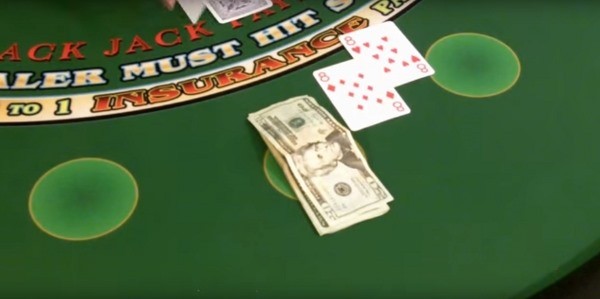
Pick up the wad of money, straighten it out and spread it, so the cameras can see. Folded money is not allowed to be played. Deal the hand as normal. If the player loses, take the money and spread it out on the table so the amount can be verified. Drop the money in the drop box. Do not just grab it and throw it in the rack while continuing on. If the player wins, take the money and lay it out so you know the amount. Take out the correct number of cheques and place them to the right side of the money. When the player wants to split or double down with a cash bet, the first thing you need to know is how much that person is playing. If you don’t automatically know, then lay it out, verify it, and then verify that the second bet matches. Be aware, it is possible for the player to grab his cash bet that he just lost and run; if this happens call the Floor or Security immediately.
Changing the Deck
A shoe game gets its decks changed every 8 hours. A handheld game will change their deck every 2 hours. This is to eliminate the possibility of someone cheating with a fixed or marked deck. The cards are then taken to a company that cuts off the edges and then packages them for resale for the casino gift shop. The procedure starts when the floorman takes the old deck off the table, opens the new deck, checks the cards and then places the new cards in the discard rack.
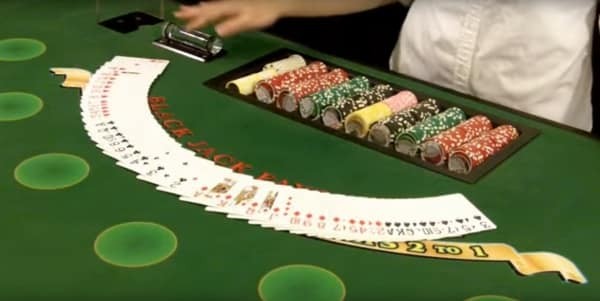
As the dealer, you’ll take the cards out of the discard rack and spread them on the table face up. When spreading the cards, it is good to spread them evenly without any chunks or gaps in between. This allows the cameras to see them better and it protects you if there are any defects found later in the game.
Verify that all the cards are there and that they are not marked in any way. Then pick up the cards and spread them again so that the back is now facing up. Check to see if there are any marks. Once you’re done checking the deck, place them in the discard rack until all the decks are verified.
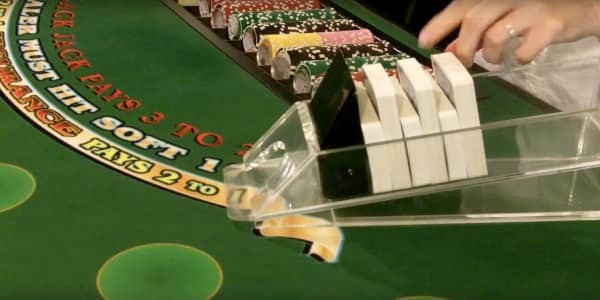
Or place them in the shoe if you are changing 6 decks or more. Wash the decks and then shuffle.
Multiple Hands
A player is allowed to play two or three hands depending on the casino, but they might have to double or triple the table minimum per hand. The player must play his first hand before doing anything with his second hand.
Multiple Hands on a Handheld Game
There are two methods you can use when pitching to someone who is playing multiple hands. For both methods the first hand will always be pitched behind the bet.

Now, the first method involves you pitching the second hand in front of the second bet.
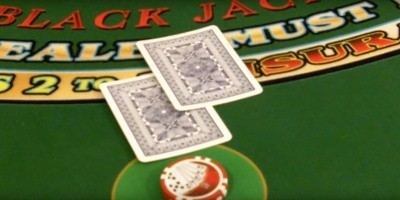
The second method has you placing the second hand neatly in front of the second bet. The 2nd method makes it easier to immediately tell if someone has touched the cards because then they would be crooked.
The player must play his initial hand first before he can touch the cards to his second hand. The only exception to this rule is when the dealer has an ace up card and is asking for insurance. Then the player can look at both hands to see if he wants to insure them or to see if he has a blackjack.
Dead Game
This is when a table has no players on it. Even if you are not dealing you still have a procedure to follow. The first thing you do is make sure your rack is clean and organized. After you’re done handling the cheques “clear your hands”. The second thing you do depends on what table you’re at. If you are on a shoe game then you shuffle the deck. If there are no new players at your table by the time you’re done shuffling then ask the floorman to cut the deck. Put the deck in the shoe and then bring the shoe in the center of the table and perpendicular to the rack then have fun waiting, when a player arrives; burn a card. If you are on a handheld game then you spread the deck face down.
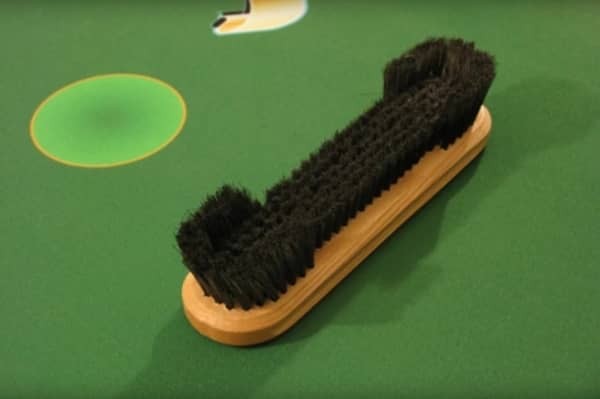
Take a look at your layout and see if it needs to be cleaned up or if the chairs need to be pushed in. Get the floors approval to straighten up the chairs, then “clear your hands” before starting. In order to get the small particles and cigarette ash off the felt, the casino will provide a brush. Start at the center of the table and use long brush strokes to get the specks off the table.
Keep your hands on the table because it’s not good practice to cross your arms or put your hands in your pocket while you’re waiting for a customer. Smile and make eye contact with the people as they walk by. During your long period of boredom, don’t touch the cards or cheques unnecessarily.
Table Minimum and Maximum
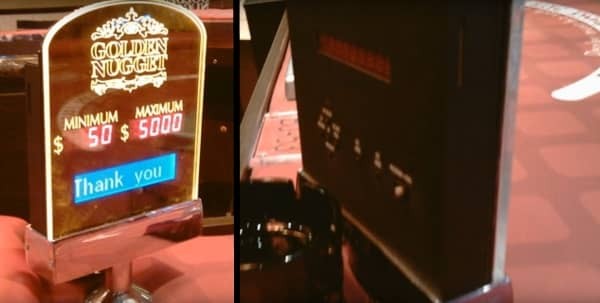
When you enter a table, always make sure you know your table minimum and maximum. Sometimes the floor will ask you to change the sign; hit the small switches behind the sign. If the player bets less than the table minimum and you don’t notice it before the cards come out, pay or take just that amount that was played. Then tell the player that they need to play the minimum on the next hand.
Foreign Cheques
When a player walks up to the table wanting to play a cheque from a different casino, don’t let them, this is a foreign cheque and it’s not considered valid currency. The dealer must call out “foreign cheques” and the floor will check to see if the casino can exchange them or not.
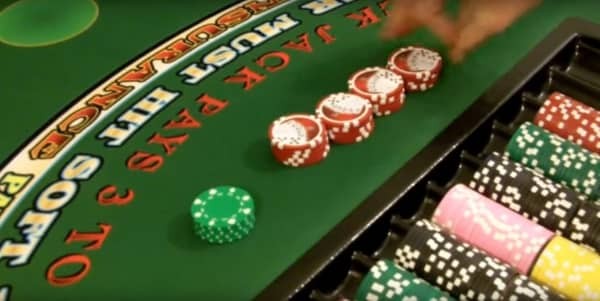
If the floor gives the approval then put the foreign cheque on the left side of the table. Take the correct amount out of the rack and place on the right side of the table and prove the amount to the cameras.
Give the player the casinos cheques, then take the foreign cheques and drop them in the drop box. If the floorman tells you that the casino can’t take the foreign cheque, then give it back to the player and suggest that the cage might be able to exchange it for them.
Alert and Approval Calls
There is a tier system of verbal calls that you are expected to make to alert the floor when certain situations happen. “Approval Calls” are made when the dealer must wait for an approval from the floor before completing an action. “Alert Calls” are made when the dealer needs to notify a floorman but does not need an approval for the action to be completed. Each house will have different rules on what calls are considered alert calls or approval calls.
Every casino is different. I’ve worked at casinos where you needed an Approval Call to change $20 and then I worked at other casinos where you call out an Alert Call to change $100 and an Approval call for $300. Basically, every house is different. The normal trend is an Approval Call for any action of $100 or more; and no call for anything less than $100. Communication is the best protective device you can build into your game.
Approval Calls
These verbal warnings are important so you must make sure the floorman knows the situation. Make the call and then wait for an approval; don’t turn away from the table to look for the floor. If you don’t hear anything, then make the call again. If the floor acknowledges you then continue with your actions. If there is a problem, the floor will issue further instructions.
The following is a list of when you’re supposed to make an approval call and what you’re supposed to say:
-
When a player tries to use foreign cheques from another casino, call out “Foreign Cheques”.
-
When a player wants to double down on anything that he can bust on; call out “Doubling on a Hard 12” or whatever the player’s total number is.
-
When a player wants to double down on a blackjack, call out “Doubling Down on a Blackjack”.
-
When a player requests “Even Money” on their blackjack during the insurance bet, call out “Even Money on a Blackjack”. At some casinos they don’t ask you to give an approval call for “Even Money”.
-
When you need to change a $100 bill, call out “Change $100”.
-
When a player needs you to change their $100 cheque for smaller denomination cheques, call out “Cheque Change $100”.
-
When a player wants to bet cash, call out “Money Plays $100” or whatever amount the player gambles.
-
When a player wishes to leave the table, trade in their many small cheques for 1 or 2 large cheques, call out “Color Up $100” or whatever amount above $100 that the player colors up with.
-
When a player suddenly plays a large bet compared to what he was playing before, call out “Cheques Play”.
-
When you’re pitching a handheld deck and one of the cards goes over the table edge call out “Card Down”.
-
When you drop a cheque or roll it off the table, call out “Cheque Down”.
-
When a player requests a marker, call out “Marker”. When a player wishes to pay off his marker, call out “Marker Down”.
-
And for anything that would make you break from your normal dealing procedure, call out “Floor” and they will come over and help you with your situation.
Alert Calls
This is only meant to notify the floor, you do not need to wait for an approval before continuing with your action.
-
When changing a $20 bill, call out “Change $20”.
-
When it’s time for the dealer to shuffle the shoe, call out “Shuffling”. When you are done shuffling the multi-deck and you need to roll it, call out “Rolling”.
-
If there are no player’s that want to cut the deck then the only one left to cut is either the dealer or the floor. If the floor isn’t around then the dealer will make the cut by first calling out “Dealer’s Cut” and then cutting the deck.
-
When a player double’s down with less money than their original bet; call out “Doubling Down for less”.
-
When a player places his bet after a card comes out or if he places his bet outside of the betting circle, then say “No Bet” and push the bet back to him.
